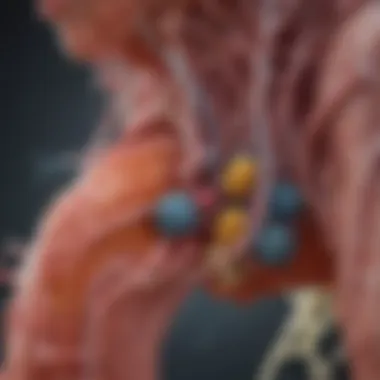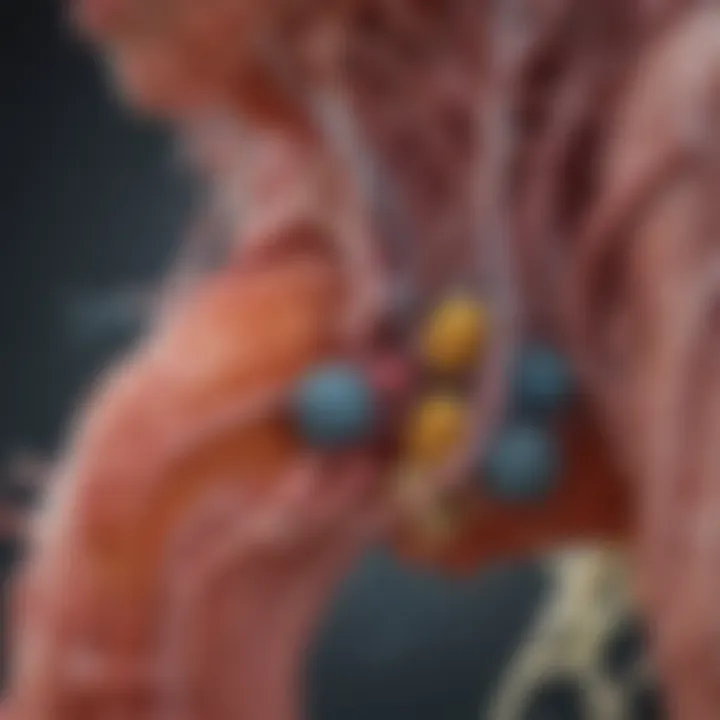Exploring Natural Male Aphrodisiacs: A Comprehensive Overview


Article Overview
In recent years, the interest in natural male aphrodisiacs has seen a significant rise. This increasing curiosity stems from a blend of cultural practices, historical use, and emerging scientific research, all contributing to a broader understanding of male sexual health. Natural aphrodisiacs are often perceived as safe alternatives to synthetic options, thus appealing to those seeking to enhance their sexual well-being. Through this article, key substances that are recognized for their aphrodisiac properties are explored. Each will be examined for its effectiveness, dosage recommendations, and potential side effects—a crucial task given the abundance of misinformation.
Summary of Key Findings
The research reveals several prominent natural substances, including Maca root, Ginseng, and Fenugreek. Each of these has been documented for their unique properties that stimulate libido and enhance overall sexual health. Studies illustrate how these substances can also impact testosterone levels and improve energy, contributing to a more satisfying sexual experience.
- Maca Root: Associated with increased libido and energy levels.
- Ginseng: Known to enhance stamina and improve erectile function.
- Fenugreek: May support testosterone levels and overall sexual health.
Research Objectives
The primary objectives of this article are:
- To systematically identify and collate evidence-based information regarding natural male aphrodisiacs.
- To explore the biological mechanisms that underpin the effectiveness of these substances.
- To provide a balanced view that considers historical, cultural, and modern perspectives on their use in enhancing sexual wellness.
Key Results and Discussions
Main Findings
The comprehensive review of literature has highlighted some significant findings. Natural male aphrodisiacs have varying degrees of effectiveness. Individual responses can differ due to a myriad of factors, including personal health status and psychological readiness. For example, Maca root has shown promise in numerous studies, displaying a notable increase in sexual desire and satisfaction among men. On the other hand, Ginseng has been linked more closely to improved performance and energy levels rather than an increase in libido.
- Biological Effects: Several substances affect hormonal pathways, thereby enhancing libido.
- Cultural Relevance: Many cultures have historically used these substances, lending credence to their effectiveness.
Implications of Findings
Understanding the implications of these findings is essential for modern sexual health discussions. Given the potential side effects of prescription medications for sexual enhancement, many men may gravitate towards natural alternatives. However, it is crucial to highlight that individuals should consult healthcare professionals before embarking on any supplementation journey.
"Natural male aphrodisiacs warrant serious consideration, but they are not a panacea for sexual health issues."
The End
In summary, this investigation into natural male aphrodisiacs reveals valuable insights into their historical use and biological efficacy. While natural options present a promising avenue for enhancing male sexual health, ongoing research remains vital to fully understand their implications. This article serves as a foundational guide to foster informed decisions regarding their use in contemporary wellness practices.
Preface to Natural Male Aphrodisiacs
Natural male aphrodisiacs play a significant role in discussions about sexual health and wellness. Interest in these substances reflects a broader cultural exploration of enhancing physiological and psychological aspects of male intimacy. By understanding natural aphrodisiacs, one can assess their potential benefits and risks in modern life.
Natural aphrodisiacs have been utilized throughout history, signifying their relevance across cultures. For many, these elements represent not just enhancements to sexual desire but also holistic approaches to health. As we delve deeper into this topic, it’s crucial to consider both the physical and mental dimensions that contribute to male sexual wellness, as well as how these agents can influence such experiences positively.
Defining Aphrodisiacs
Aphrodisiacs are substances known for their potential to stimulate sexual desire and performance. This definition encompasses a wide range of both natural and synthetic products. While some may rely on biochemistry to increase libido, others might act through psychological pathways, enhancing mood and reducing anxiety, which can impact sexual function significantly. To ensure a clear understanding, it's essential to recognize the following points:
- Aphrodisiacs can be food, herbs, or other substances.
- Their effects can vary significantly from person to person.
- The scientific basis supporting their efficacy is often debated.
The acknowledgement of what defines an aphrodisiac sets the foundation for further exploration within this article.
Historical Context
The historical use of aphrodisiacs extends back centuries and spans many cultures worldwide. Ancient texts reveal that civilizations from Greece to China have turned to natural substances to enhance sexual activity. For example, the ancient Greeks often utilized various herbs and foods to stimulate libido, believing in their divine powers. Similarly, traditional Chinese medicine has incorporated these elements into its practices, suggesting that balance in the body can lead to enhanced sexual health.
In some cultures, these substances held ritualistic significance. The perception that consuming specific foods or herbs could lead to improved sexual experiences has manifested in both folklore and scientific inquiry. Here are some notable observations:
- Cultural Traditions: Many societies have developed unique practices surrounding the use of aphrodisiacs.
- Evolution of Usage: Over time, the understanding of what constitutes an aphrodisiac has evolved, influenced by changes in scientific knowledge and cultural acceptance.
- Modern Perspectives: Today, interest in these natural substances continues, with an increased desire to find less synthetic solutions to intimacy challenges.
Understanding this historical context highlights not only the ongoing fascination with aphrodisiacs but also the transitions in their applications and perceptions over time. It lays the groundwork for analyzing their potential benefits and uses in contemporary times.
Understanding Male Sexual Health
Understanding male sexual health is crucial when examining the role of natural aphrodisiacs. Sexual health encompasses various physiological and psychological aspects that affect male sexuality. Awareness of these elements can lead to a healthier sexual life, enhancing not only intimate relationships but also overall well-being. Natural aphrodisiacs aim to support these facets, which can boost confidence and improve sexual function.
Physiological Factors
Physiological factors play a significant role in male sexual health. The body responds to various stimuli, and several systems must work in harmony to ensure optimal sexual performance. This includes hormonal balance, blood flow, and proper functioning of the nervous system.


Hormonal levels, particularly testosterone, are vital. Testosterone influences libido and erectile function. A deficiency can lead to reduced sexual desire and performance issues. Therefore, natural aphrodisiacs may help in stimulating hormone production, leading to improved sexual health. For example, ingredients like Ginseng have shown promise in increasing testosterone levels.
Moreover, good blood circulation is fundamental. Adequate blood flow ensures that the penis can achieve and maintain an erection. Natural substances, such as dark chocolate and oysters, might promote better circulation due to their high antioxidant content. These foods support cardiovascular health, which is directly linked to sexual performance.
Lastly, the nervous system's health ensures that sexual arousal and response occur smoothly. Stress, anxiety, and other emotional factors can impact this system. Some natural aphrodisiacs have calming effects, which may help alleviate some of these issues, promoting a better sexual experience.
Psychological Influences
Psychological factors significantly impact male sexual health, influencing both desire and performance. Anxiety about sexual performance, low self-esteem, and unresolved emotional issues can create barriers to a satisfying sexual life. Therefore, addressing the psychological aspects of sexual health is essential.
Natural aphrodisiacs can also function at a psychological level. Their consumption can lead to increased confidence and improved mood, which are essential for a healthy sex drive. For instance, Maca root has been reported to enhance mood and reduce feelings of anxiety. This can create a more conducive environment for intimacy.
Moreover, the historical context and cultural significance of certain foods can add an element of desire. In various cultures, specific foods are believed to enhance virility and sexual prowess, creating a psychological effect that feeds into individual beliefs and expectations. This interplay between food, belief, and sexual health is an area worthy of further exploration.
Biological Mechanisms of Aphrodisiacs
Understanding the biological mechanisms of aphrodisiacs is crucial. This section focuses on how these substances affect male sexual health. It sheds light on both hormonal impacts and nutritional contributions, providing insight into the efficacy of various natural aphrodisiacs.
Hormonal Impacts
Hormones play a pivotal role in human sexuality. Natural aphrodisiacs can influence the endocrine system, impacting levels of hormones such as testosterone and oxytocin. Testosterone is essential for libido and sexual performance. Some natural supplements can elevate testosterone levels, enhancing sexual desire and overall male vitality.
In addition, oxytocin, sometimes dubbed the "love hormone," affects emotional bonding and sexual arousal. Certain herbs, like Maca, have been shown to possibly increase oxytocin production, thereby enhancing emotional connection during intimate moments. It’s worth noting that the relationship between hormones and aphrodisiacs is complex. However, understanding this interaction can provide valuable information about how specific substances may enhance sexual performance.
Nutritional Contributions
Diet is a critical aspect of male sexual health. Nutritional components of various aphrodisiacs contribute significantly to their effectiveness. Foods rich in zinc, for example, are vital for testosterone production. Oysters are famous for being high in zinc, making them a popular natural aphrodisiac. Other food items such as dark chocolate contain flavonoids that can aid blood circulation, essential for sexual function.
Furthermore, the presence of antioxidants in foods helps improve overall health, providing the body with the necessary nutrients to support sexual wellness. Consuming a balanced diet rich in fruits, vegetables, and lean proteins can elevate the body’s energy levels, indirectly enhancing libido.
Key Natural Aphrodisiacs
The exploration of natural male aphrodisiacs is not just about enhancing desire but also about understanding their cultural, historical, and biochemical significance. Natural aphrodisiacs hold potential benefits that extend beyond the bedroom, influencing overall wellness and vitality. Knowing specific herbs, plants, foods, and nutrients is critical for readers interested in optimizing their sexual health.
This section will delve into key natural aphrodisiacs, focusing on their origins, distinct features, and impact on male sexual function. Proper comprehension of these substances will aid in making informed choices regarding their use.
Herbs and Plants
Ginseng
Ginseng is often regarded as a cornerstone of traditional medicine. It is well-known for its potential to improve stamina and reduce stress levels. This adaptogenic herb is a beneficial choice due to its ability to enhance energy and vitality. One unique feature of ginseng is the presence of ginsenosides, compounds believed to play a crucial role in its effects on sexual health.
Advantages of ginseng include its broad applicability; it caters to various health aspects. However, there are some disadvantages as well. For some individuals, ginseng may cause insomnia or nervousness, particularly when taken in high doses.
Maca
Maca has gained attention for its adaptogenic qualities and potential effects on libido. It is a cruciferous vegetable from the Andes, known for its nutritional density. One of the key characteristics of maca is its reputation for enhancing libido and fertility. It is often consumed in powder form or as capsules.
Maca’s unique feature lies in its ability to influence hormone balance without exerting estrogenic effects. Many consider it a beneficial addition but acknowledge the lack of extensive clinical trials that might support its widespread claims.
Tribulus Terrestris
Tribulus Terrestris is recognized for its role in boosting testosterone levels. This herb is popular among athletes for its potential to improve strength and performance. A notable aspect of Tribulus Terrestris is its active compound, protodioscin, which is thought to stimulate testosterone production.
Its advantages are clear, as it seeks to enhance athletic performance and improve libido. However, results can vary, and some studies suggest that it may not significantly impact testosterone levels in all individuals, highlighting the need for further research.
Foods and Nutrients
Dark Chocolate
Dark chocolate is often celebrated not just for its taste but also for its aphrodisiac properties. Rich in flavonoids, it can improve circulation. The key characteristic that makes dark chocolate a popular choice is its ability to release endorphins, promoting feelings of pleasure.
Its unique feature is the high level of antioxidants contained within, which contributes to heart health as well. The downside is its caloric density, so moderation is essential while enjoying its benefits.
Oysters
Oysters have long been revered as a natural aphrodisiac attributed to their high zinc content. Zinc plays a significant role in testosterone regulation. One key characteristic of oysters is their rich nutritional profile, which includes various vitamins and minerals.


The unique feature of oysters is their reputed influence on enhancing sexual desire. The disadvantages include the potential for allergies and overconsumption risks, especially if sourced from areas with lower hygiene standards.
Honey
Honey, revered across cultures, is known for its natural sweetness and health benefits. It contains nutrients that can contribute to increased energy levels. A key characteristic of honey is its high levels of boron, which may support testosterone levels.
Its uniqueness lies in its versatility; honey can be easily incorporated into various diets and recipes. However, concerns exist regarding the high sugar content, making moderation important to avoid adverse health impacts.
Effectiveness of Natural Aphrodisiacs
The effectiveness of natural aphrodisiacs is crucial in understanding their role in male sexual health. This aspect explores how these substances work, their benefits, and the considerations that arise with their use. Understanding their effectiveness can help individuals make informed decisions regarding sexual health and wellness.
Scientific Evidence
Various studies have explored the effectiveness of natural aphrodisiacs, presenting both promising findings and the need for further research. Scientific evidence often stems from clinical trials and experimental studies that aim to assess the efficacy of specific substances.
- Herbs like Ginseng and Maca have been subjects of interest due to their potential to enhance libido and improve sexual function. According to some studies, Ginseng may boost testosterone levels, thus influencing sexual desire. Similarly, Maca has shown potential in enhancing libido but the mechanisms need more clarity.
- Clinical Trials have often indicated that some aphrodisiacs may result in increased blood flow, which is essential for sexual arousal and performance. For instance, a study involving Tribulus Terrestris suggested improved sexual satisfaction among participants, though the specific results vary widely.
Research shows that natural substances often work differently for each individual, suggesting a tailored approach may be beneficial.
- Hormonal Influences: Several ingredients may have hormonal effects, including boosting testosterone. This is critical because hormones play a significant role in male sexual health.
However, it remains essential to approach these findings with caution. While some evidence is encouraging, the scientific community recognizes that more rigorous studies are necessary to establish clear links and mechanisms.
Anecdotal Reports
In addition to scientific evidence, anecdotal reports offer valuable insights into the effectiveness of natural aphrodisiacs. These accounts come from individual experiences shared through various platforms, including forums, social media, and personal testimonies.
- Personal Testimonials: Many individuals speak about their experiences with specific aphrodisiacs, such as dark chocolate or oysters. Users often report changes in libido and overall sexual satisfaction, although these experiences are subjective and can vary significantly from one person to another.
- Cultural Experiences: In many cultures, certain foods and plants hold significant esteem as aphrodisiacs. For example, the consumption of honey and nuts is often linked to increased vitality and sexual health. These cultural practices reinforce the belief in the aphrodisiac properties of these substances, even without scientific backing.
- Community Discussions: Online platforms like Reddit and various wellness forums serve as spaces where individuals share their thoughts and experiences regarding natural aphrodisiacs. These discussions can provide insights into what works for different people, although caution is needed due to the subjective nature of the reports.
Traditional Practices Across Cultures
The investigation of natural male aphrodisiacs extends beyond their biological impact. It includes the rich tapestry of traditional practices across cultures that have utilized these substances for centuries. Many societies have developed unique rituals and beliefs surrounding these aphrodisiacs, often intertwining them with their cultural identities. This section aims to explore these cultural dimensions, as they offer valuable insights into the longstanding significance of aphrodisiacs.
Cultural Beliefs and Practices
Around the globe, various cultures uphold distinct beliefs regarding the effectiveness of natural aphrodisiacs. In traditional Chinese medicine, for example, certain herbs, such as ginseng, are thought to restore balance and vitality. Such beliefs are not limited to Asia, as ancient civilizations around the Mediterranean and in Africa have also integrated aphrodisiacs into their practices.
- Types of Practices: Many tribes have rituals that involve the consumption of specific foods believed to enhance sexual performance.
- Symbolism: In many cultures, the use of these substances is imbued with symbolic meaning. An example includes the use of certain fruits during fertility ceremonies.
Modern interest often draws from these cultural practices, seeking to understand their benefits holistically.
Rituals Involving Aphrodisiacs
Rituals that involve aphrodisiacs vary widely, from simple meals to elaborate ceremonies. These activities can serve multiple purposes, including bonding and celebrating relationships.
- Cooking Traditions: Preparing aphrodisiac-rich meals can be a way to forge intimacy in a relationship. For instance, in many cultures, a meal containing oysters is often served during romantic occasions due to their perceived effects.
- Ceremonial Uses: Many cultures engage in specific rituals that involve aphrodisiacs. In some communities, these might occur during wedding festivities, embodying hopes for fertility and passion.
By engaging in these traditional practices, individuals not only embrace cultural heritage but can also find methods to enhance their sexual health naturally.
Despite the anecdotal evidence supporting aphrodisiac use, it is critical to approach these traditions with careful consideration and respect for their origins. As we integrate these ancient practices into modern wellness, understanding their cultural significance is key.
Safety and Risks Associated with Natural Aphrodisiacs
Understanding the safety and risks associated with natural aphrodisiacs is critical when considering their use for enhancing male sexual health. Awareness of potential side effects and interactions with other substances can help individuals make informed decisions. As these substances vary widely in composition and potency, not every natural ingredient is suitable for everyone. Therefore, discussing safety considerations is essential in guiding users safely through their choices.
Potential Side Effects
Each natural aphrodisiac can produce different side effects, often depending on factors such as dosage and individual health conditions. Some users might experience mild effects, while others may encounter more severe reactions. Common side effects include:
- Gastrointestinal issues: Some herbs, like Ginseng and Maca, may cause digestive disturbances in certain individuals, leading to symptoms like nausea, bloating, or diarrhea.
- Allergic reactions: People sensitive to specific plants might experience allergic reactions, which can range from mild skin irritations to more serious respiratory issues.
- Increased heart rate: Ingredients like Tribulus Terrestris can elevate heart rate, proving problematic for individuals with pre-existing heart conditions.
- Hormonal disruptions: Overconsumption of certain substances can lead to hormonal imbalances, particularly in individuals with hormonal disorders.
Awareness of these potential side effects is necessary. Consulting healthcare professionals before starting any aphrodisiac is advisable for optimal safety.
Drug Interactions
Natural aphrodisiacs can interact with prescribed medications or other supplements. These interactions may lead to diminished efficacy of drugs or increased risk of side effects. Some key considerations include:


- Blood thinners: Certain natural substances, including Ginkgo Biloba, can enhance blood flow but may also increase the risk of bleeding when taken with anticoagulant medications.
- Antidepressants: Some natural aphrodisiacs might alter serotonin levels, which can interact negatively with SSRIs, leading to side effects like increased anxiety or mood swings.
- Antihypertensives: Ingredients that lower blood pressure might dangerously drop blood pressure when combined with medications targeting hypertension.
It is crucial for individuals considering natural aphrodisiacs to consult healthcare professionals regarding any potential drug interactions. Understanding these elements contributes significantly to making informed choices regarding the utilization of aphrodisiacs, thereby ensuring a safer experience.
Dosage and Administration Guidelines
Understanding dosage and administration guidelines is vital when it comes to natural male aphrodisiacs. Each substance has its specific recommended levels to ensure they offer potential benefits without causing adverse effects. Misuse of these substances can lead to negative outcomes, undermining their purpose. Therefore, knowledge about proper dosages can significantly enhance the effectiveness of these natural aids and help individuals achieve desired outcomes safely.
Recommended Dosages
The recommended dosages for natural aphrodisiacs vary significantly, depending on the specific substance. Here are some examples of commonly used natural aphrodisiacs and their suggested dosages:
- Ginseng: Typically, the dosage ranges from 200 to 400 mg per day. Ginseng may have mood-boosting properties along with its aphrodisiac effects.
- Maca: A common dosage is around 1.5 to 3 grams per day. This root is known for improving stamina and libido.
- Tribulus Terrestris: Users often take between 250 to 750 mg per day. This plant is believed to enhance testosterone levels, thereby raising sexual desire.
- Dark Chocolate: Consuming about 1 ounce may benefit mood and libido due to the presence of flavonoids and phenylethylamine.
- Oysters: Eating a small number, approximately six medium oysters has been thought to boost testosterone levels because of their high zinc content.
These dosages serve as general guidelines. Individual responses may differ based on factors like health status, age, and existing medical conditions. It is prudent to consult a healthcare professional before beginning any new supplement regimen.
Forms of Consumption
Natural aphrodisiacs can be consumed in various forms, each with its unique advantages. The choice of consumption method can affect how well these substances work in the body. Here are some common forms:
- Capsules and Tablets: These provide a measured dose and are convenient for those on the go. They often contain powdered forms of herbs.
- Powders: Substances like maca can be found in powder form, allowing users to add them to smoothies or foods for easier ingestion.
- Tinctures: Liquid extracts that can be taken directly or mixed with water. Tinctures often have concentrated effects due to their extraction processes.
- Teas: Many herbs can be brewed into tea, offering a soothing way to consume them. Ginseng tea is popular and generally easy to prepare.
- Foods: Some aphrodisiacs come naturally in foods, like dark chocolate and oysters. Incorporating these into meals can be both pleasurable and effective.
Choosing the right form depends on personal preferences and dietary habits. Each method may have distinct rates of absorption and effects.
Always remember that effectiveness can be greatly enhanced by understanding proper dosages and the best forms of consumption. Making informed choices is essential for maximizing the potential benefits of natural aphrodisiacs.
Exploring the Future of Aphrodisiac Research
The exploration of natural male aphrodisiacs is not merely historic or anecdotal; it is an evolving field that holds great promise for understanding sexual health and well-being. Research into aphrodisiacs encapsulates a blend of traditional knowledge and modern scientific inquiry. This section addresses the emerging trends and innovations driving future research, highlighting how these developments can reshape our understanding and usage of aphrodisiac substances.
Emerging Ingredients and Innovations
The landscape of natural aphrodisiacs is expanding rapidly, with new ingredients being discovered and old ones being reevaluated. Many researchers are investigating potential aphrodisiac properties of lesser-known herbs and plants. For instance, studies on herbal compounds such as Horny Goat Weed and Fenugreek are gaining traction. Early research suggests that these ingredients may influence testosterone levels and enhance libido in both men and women.
Additionally, the role of certain phytochemicals is under scrutiny. Compounds like alkaloids and flavonoids found in various plants are being studied for their ability to enhance blood flow and increase sexual arousal. Ongoing clinical trials are likely to yield significant data, providing deeper insights into how these natural substances interact with human physiology.
Key considerations in emerging research include:
- Standardization of dosages for efficacy
- The role of bioavailability in natural compounds
- Potential side effects and long-term use studies
As new ingredients are validated through scientific inquiry, the market for natural aphrodisiacs may evolve significantly, necessitating a reevaluation of traditional practices.
Integrating Traditional and Modern Approaches
In the convergence of traditional and modern practices lies a promising avenue for aphrodisiac research. Holistic approaches that merge cultural wisdom with empirical research can enrich our understanding of male sexual health. Many aphrodisiac substances have been used in various cultures for centuries, often integral to traditional medicine. These historical perspectives provide valuable anecdotal evidence that can guide modern scientific investigation.
Integrating these approaches requires a multi-disciplinary framework. Researchers should:
- Work alongside herbalists and practitioners of traditional medicine to gain insights into effective formulations.
- Conduct studies to scientifically validate claims rooted in culture and tradition.
- Promote awareness of how these natural substances can coexist within the broader scope of wellness practices today.
"The fusion of ancient wisdom and contemporary science may illuminate new pathways for enhancing male sexual health."
Culminations and Recommendations
The exploration of natural male aphrodisiacs offers significant insights into their roles in enhancing male sexual health. These substances, drawn from plants, herbs, and certain foods, have been recognized for centuries across various cultures. Their potential to improve libido and sexual performance holds compelling interest for both researchers and individuals seeking natural alternatives to traditional medications.
When considering the use of natural aphrodisiacs, it is crucial to approach them with an understanding of their efficacy, safety, and integration into one’s lifestyle. Each aphrodisiac may affect individuals differently, depending on various factors such as physiology and psychological state. Thus, personal experiences and feedback should be taken into account when evaluating their usefulness.
Furthermore, as scientific insights continue to grow, the relationship between these natural products and sexual health becomes clearer. Such knowledge not only informs individuals but can also guide practitioners in recommending appropriate treatments based on evidence.
Ultimately, recognizing the heterogeneous nature of responses to natural aphrodisiacs will aid in crafting more personalized health strategies for enhancing sexual well-being.
Final Thoughts on Natural Aphrodisiacs
Natural aphrodisiacs can serve as complementary options for those looking to improve their sexual health. Unlike pharmaceutical alternatives, they often have fewer side effects and can be integrated into daily nutrition. However, it is essential to understand that no single aphrodisiac guarantees enhancement in sexual function. Personal variations in response highlight the need for careful consideration and research before incorporating these substances into one’s regimen. It is advisable to consult healthcare professionals to ensure that any chosen aphrodisiac aligns with one's particular health needs and conditions.
Practical Considerations for Users
When considering the use of natural aphrodisiacs, individuals should keep in mind several factors:
- Personal Health Status: Preexisting medical conditions or medications can influence the effectiveness of aphrodisiacs.
- Source and Quality: Ensure that the chosen natural products come from reputable sources to minimize potential contamination or adulteration.
- Dosage and Consumption: Understanding appropriate dosages can prevent adverse effects. Start with small amounts to gauge individual responses.
- Monitor Effects: Keep a journal to track any changes in sexual health or libido, which can assist in understanding what works best.
- Integration with Lifestyle: Combine natural aphrodisiacs with a healthy diet, regular exercise, and stress management for optimal results.
Natural male aphrodisiacs hold promise, yet responsible use and informed choices remain vital for achieving desirable outcomes. Research and personal mindfulness can enhance the experience and effectiveness of these natural options.







